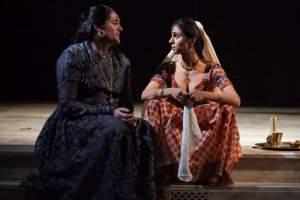Dara
After the current Behind the Beautiful Forevers, which told a contemporary story of life in the slums of a neighbourhood on the edges of India's Mumbai airport, the National offers another bracing encounter with South Asian culture - this time by way of the imperial court in 17th century Mughal, that tells of a succession struggle between two Princes there and plays out a philosophical battle over religious belief that continues to resonate across the world today.
This is a passionate but strange historical story - according to a programme note, "Most educated girls or boys in today's India, Pakistan, Bangladesh and Afghanistan will know the basic story of the Mughal Muslim princes, Dara and Aurangzeb."
The rest of us, though, have some catching up to do. Playwright Tanya Ronder's adaptation from Shahid Nadeem's play that was first performed by Pakistan's Ajoka Theatre helps us connect to the story, but there's an otherworldliness to Nadia Fall's carefully paced, occasionally exotic staging that takes getting used to.
The play is a serious slow-burn. But it repays attention, particularly in a trial scene when Dara is put on trial for his life for his beliefs; and again in another, briefer scene between a court eunuch and the parents who submitted him to that fate as a child.
I'm not sure that the play will have wide mainstream appeal, but the National Theatre is to be applauded for stretching its cultural reach east as well as West. Could this, at last, be the year for Asian-influenced theatre to thrive in London? I'm looking forward to Bend it Like Beckham, the new musical based on the film of the same name that's coming to the Phoenix in May - as well as to Beyond Bollywood, a spectacle that will run at the London Palladium (also in May).
"Performances can feel one-dimensional or forced - but then, the script frequently facilitates this by being flatly over-expositional."
Holly Williams for The Independent
"The writing is too often lifeless, as Ronder hasn't made this the fully-rounded family psychodrama it needs to be to grab our attention and then steer it towards higher matters of faith and politics."
Fiona Mountford for The Evening Standard
"Not all the performances are as commanding, and the production moves disconcertingly between stylised, declamatory scenes, and more naturalistic moments."
Laura Barnett for The Telegraph
External links to full reviews from popular press
The Independent - The Telegraph
Originally published on
